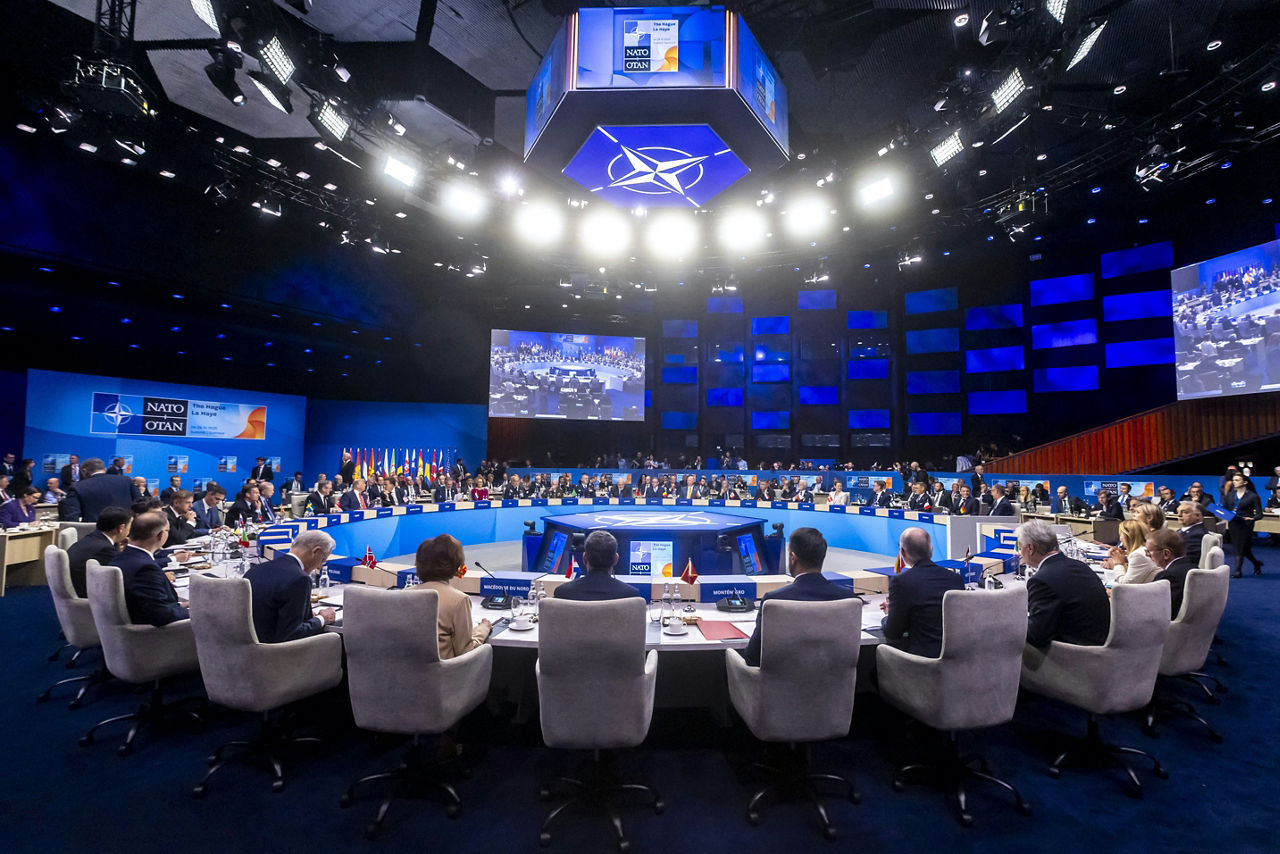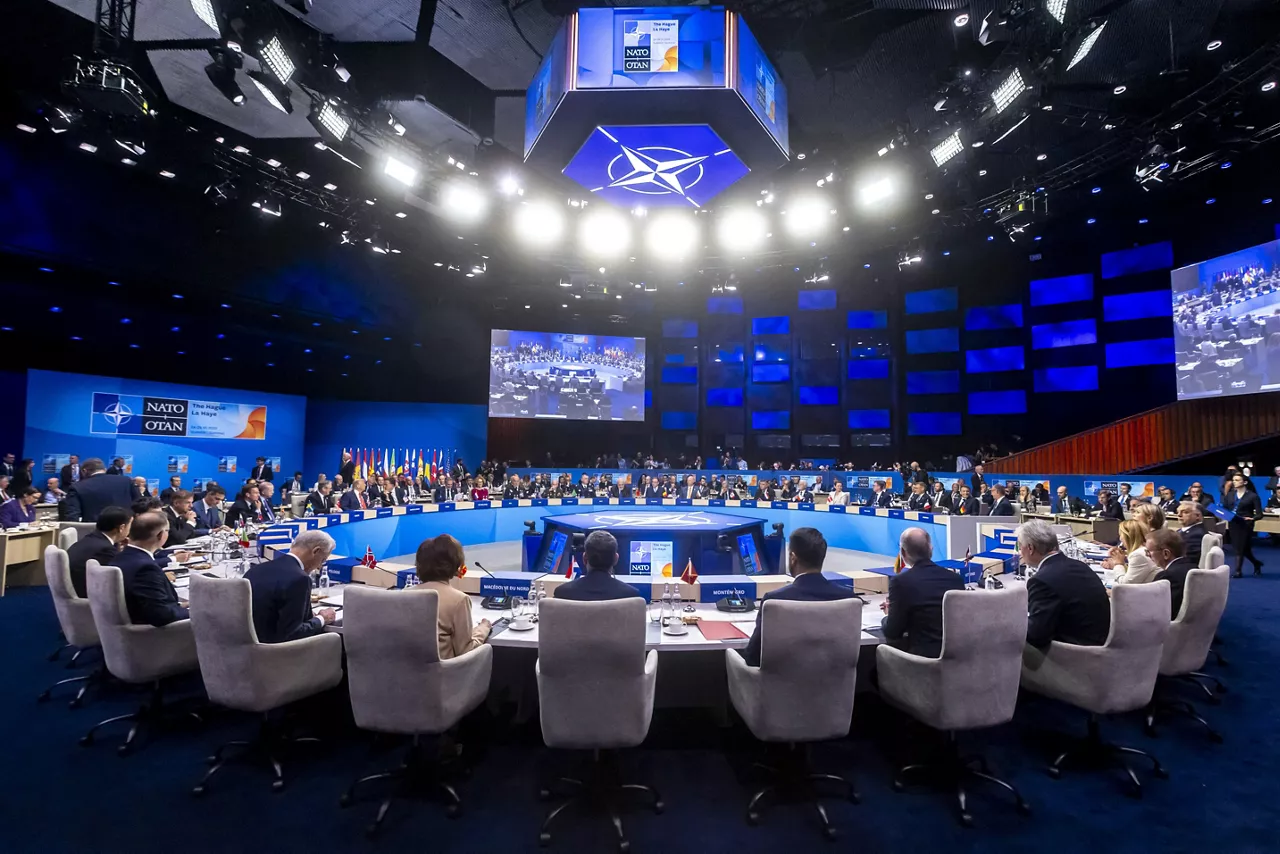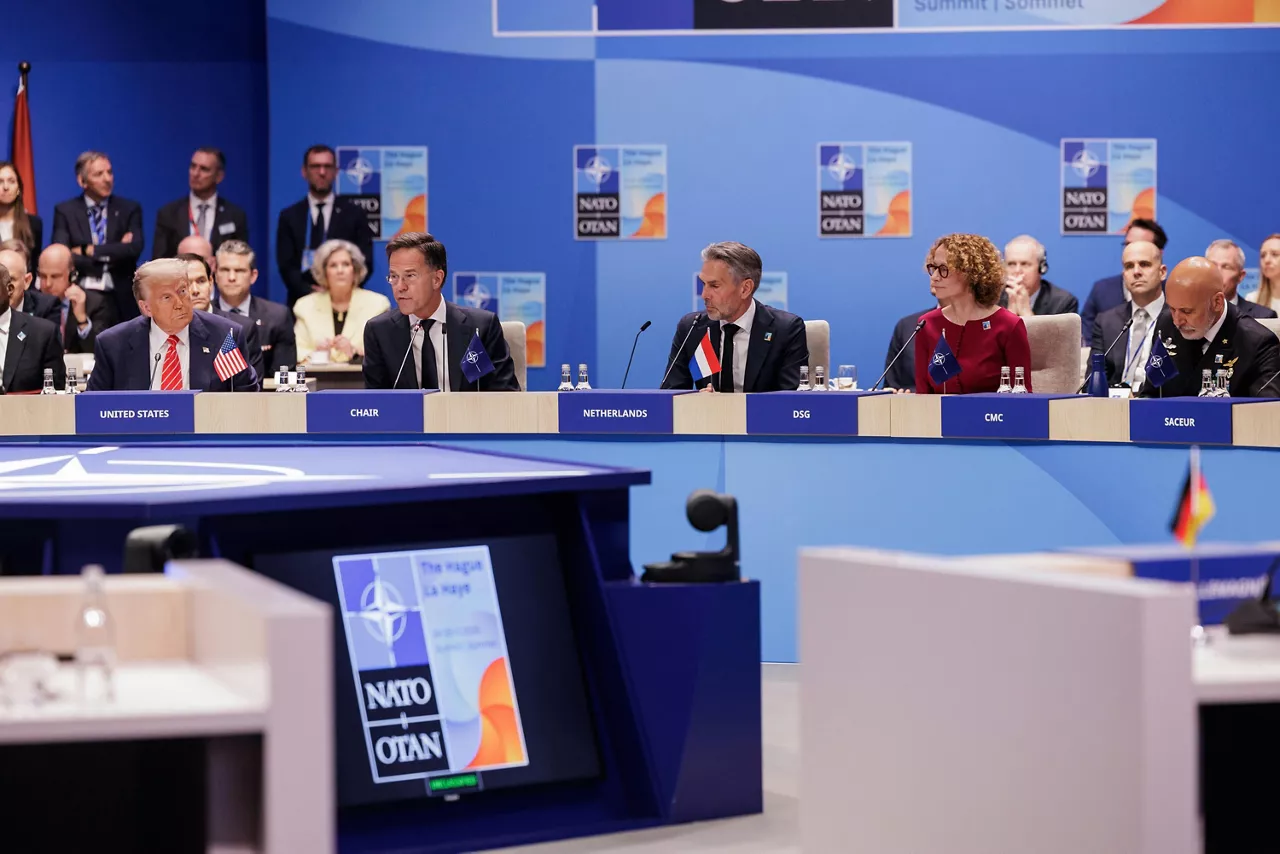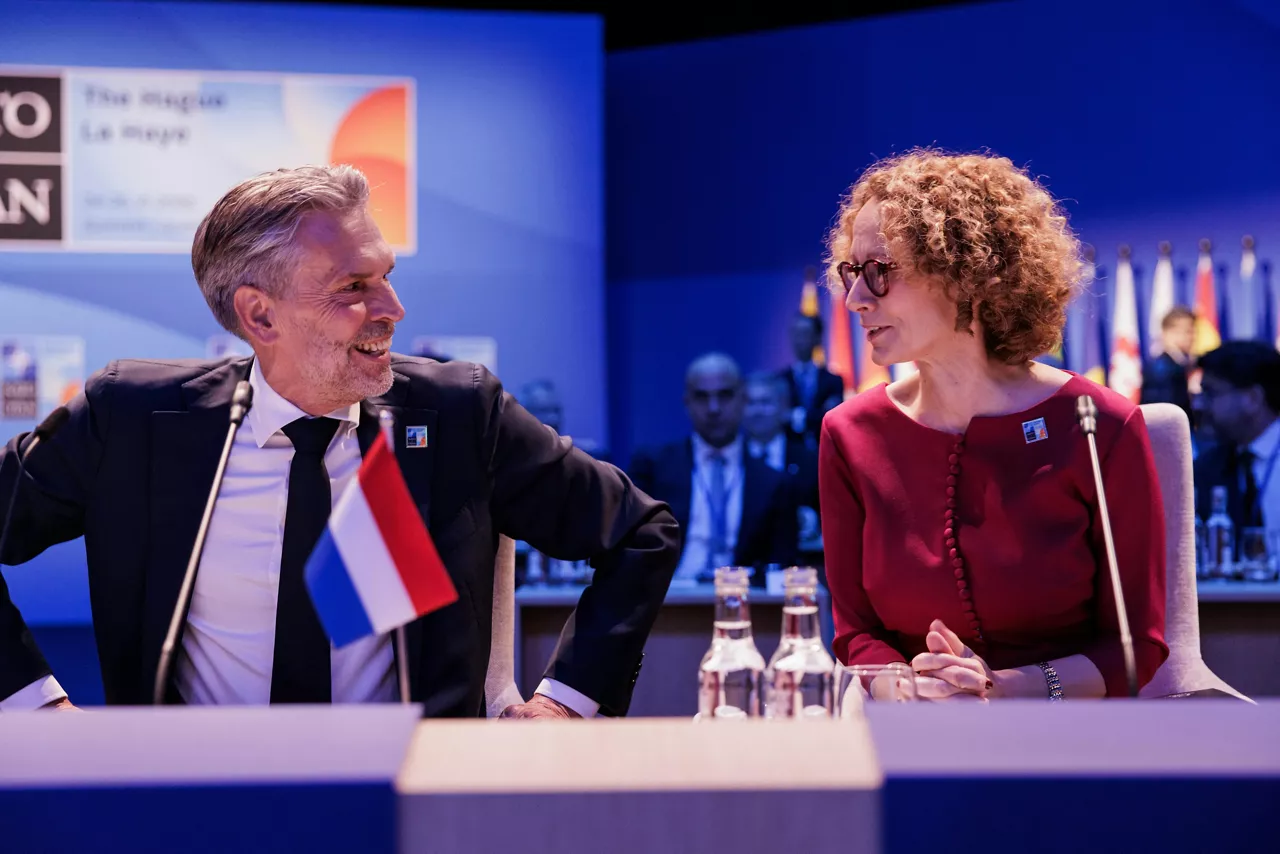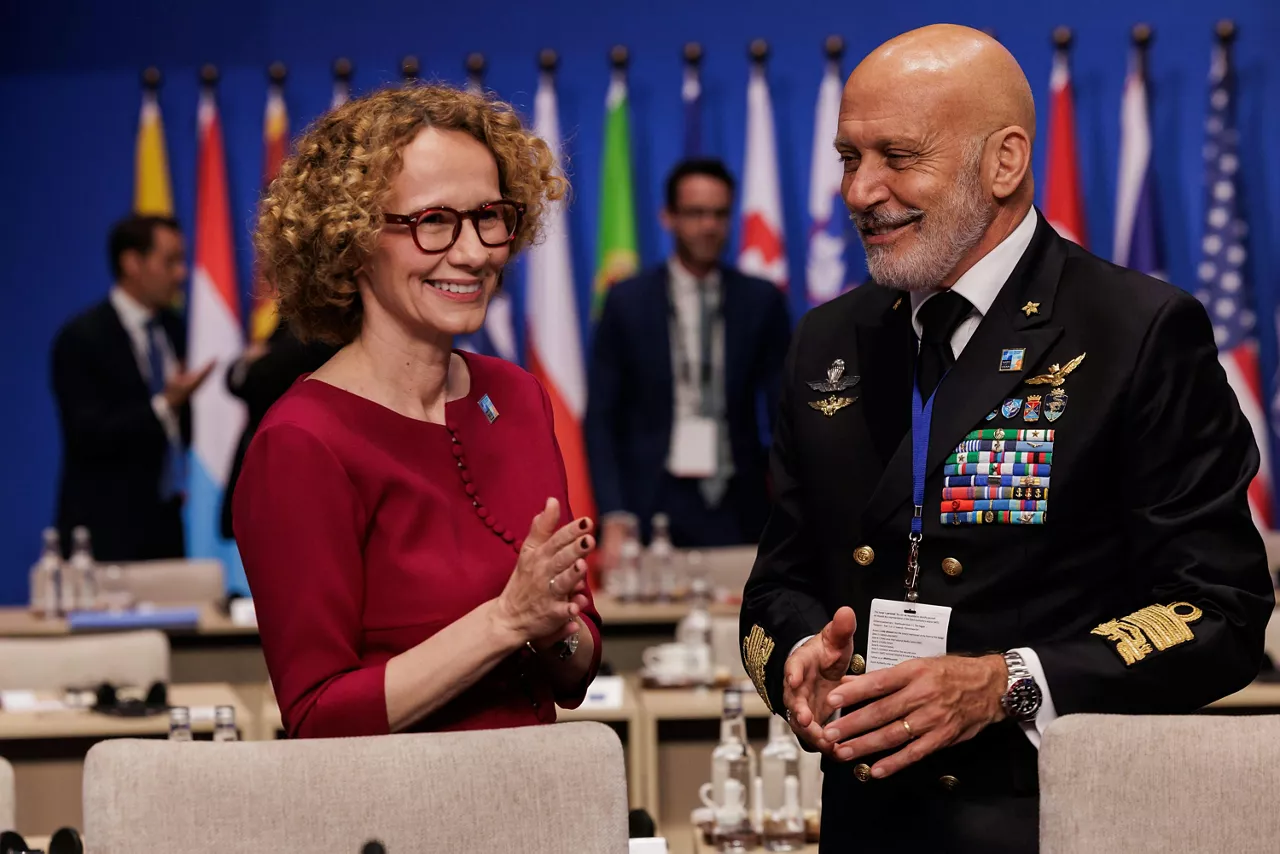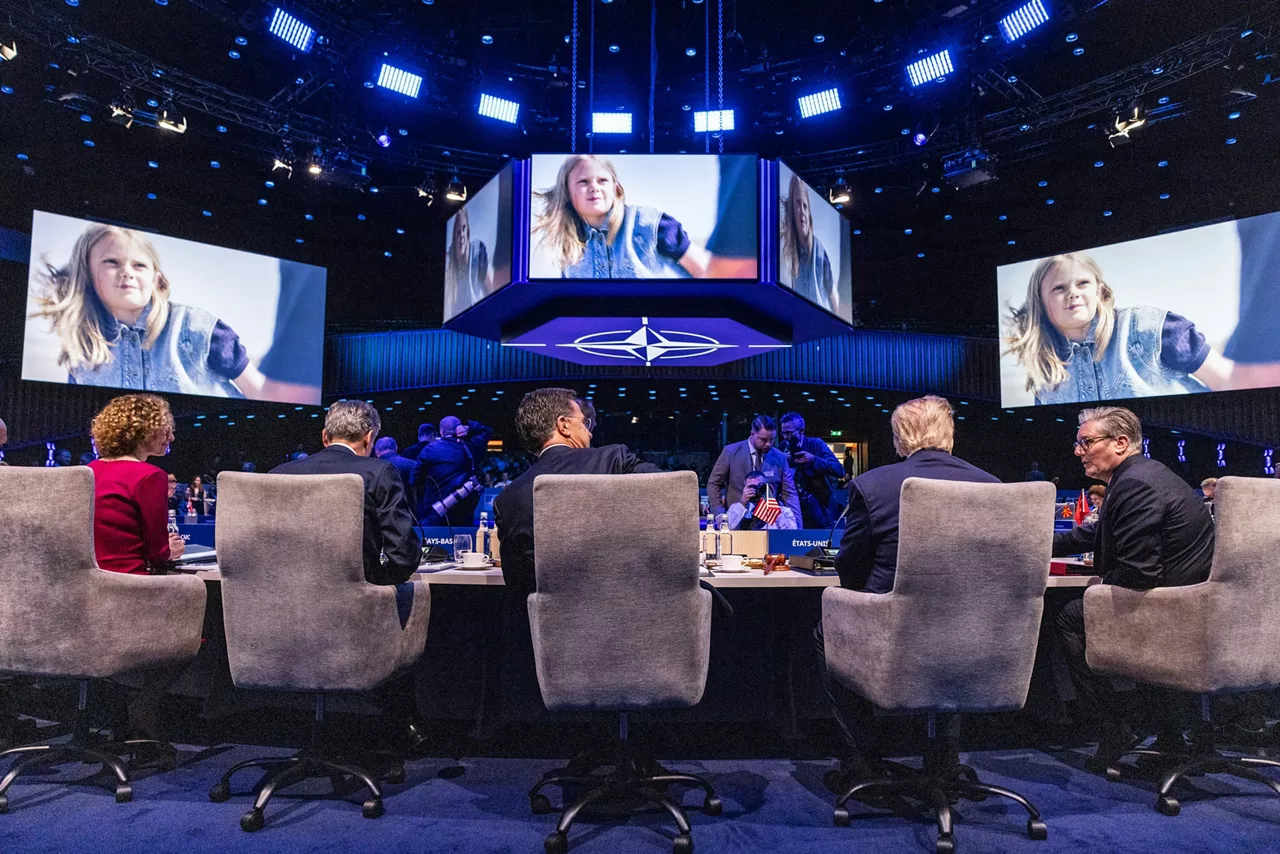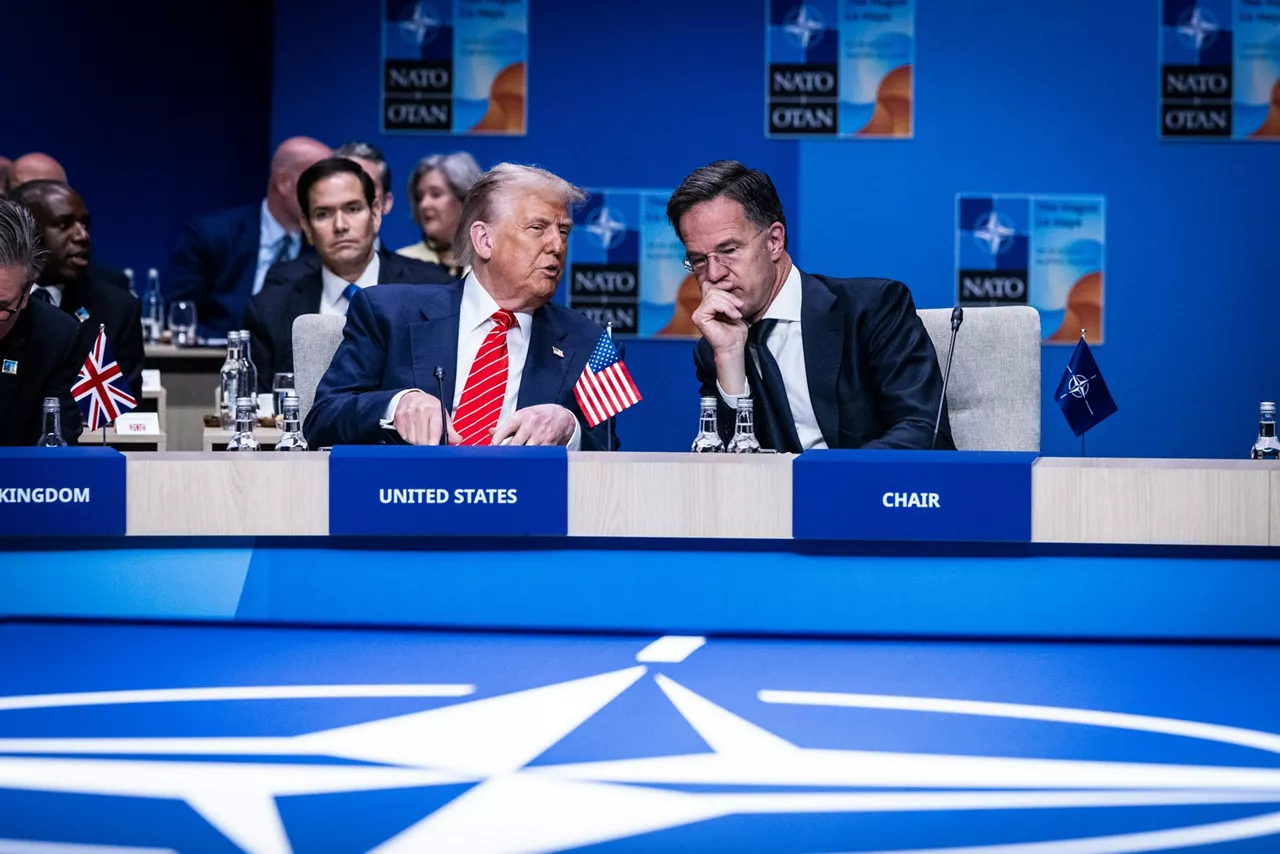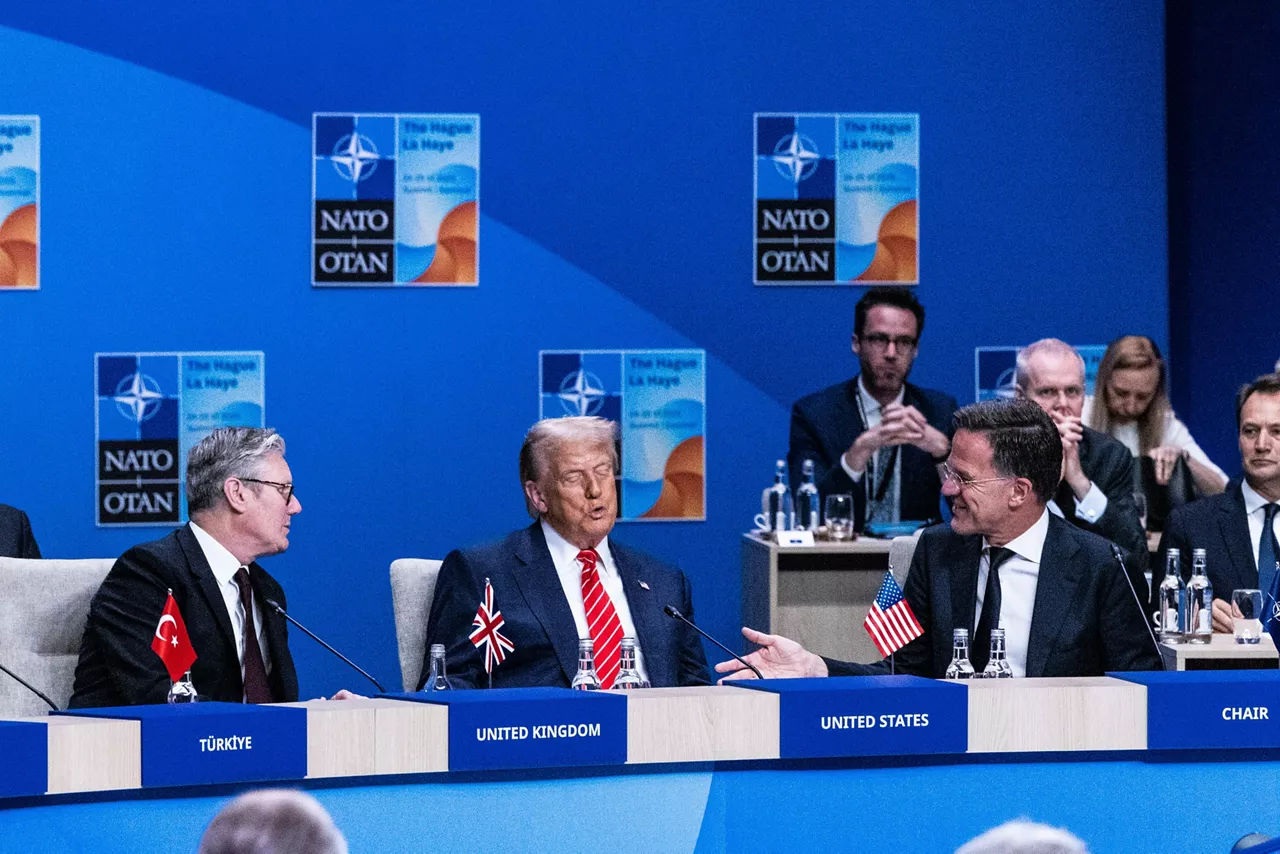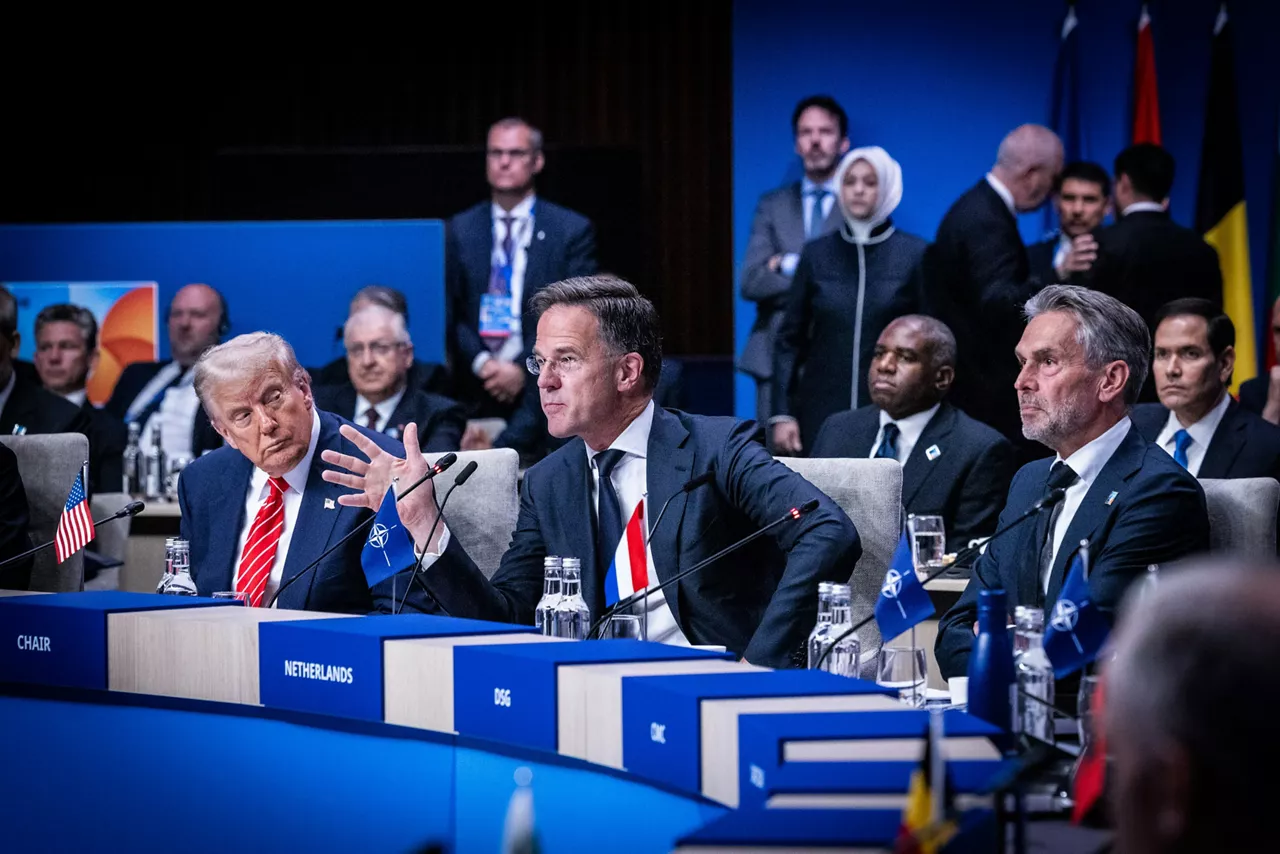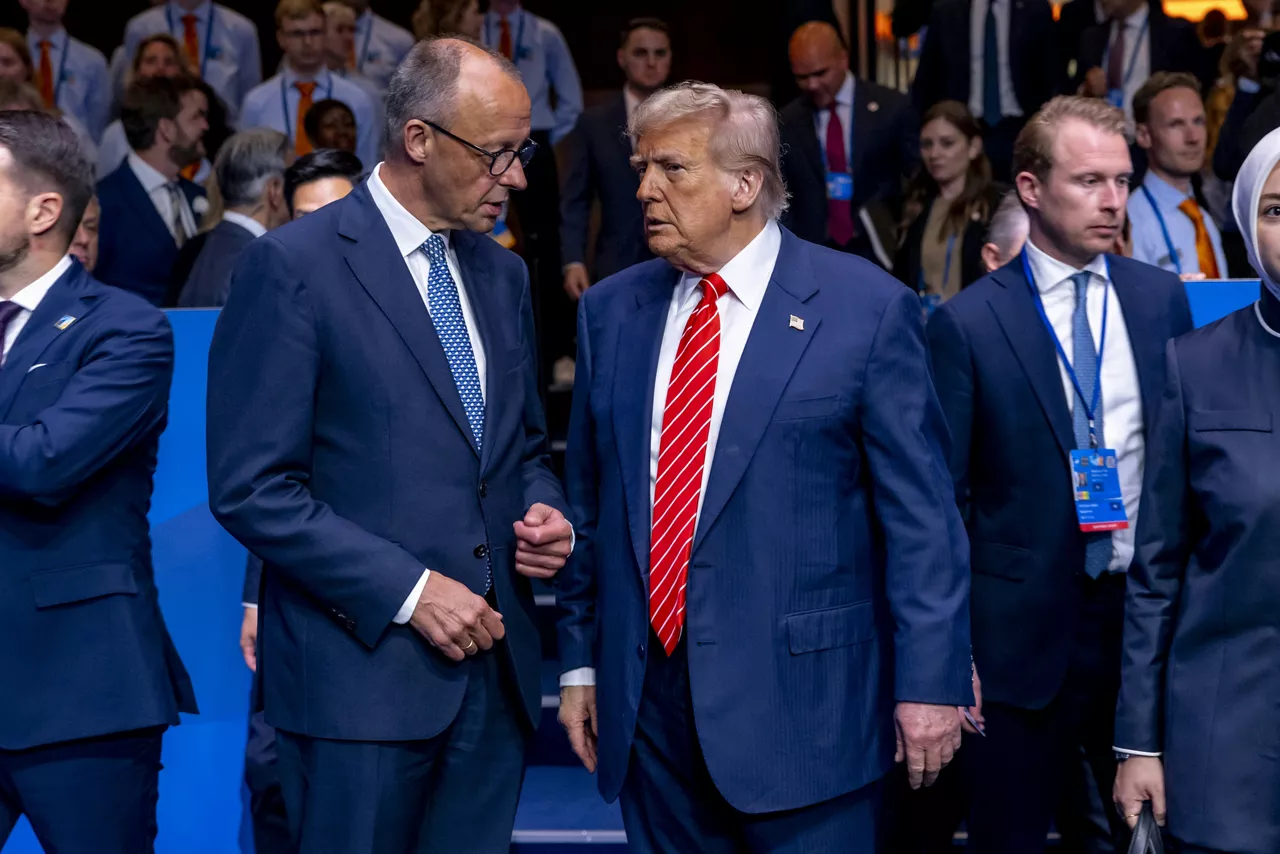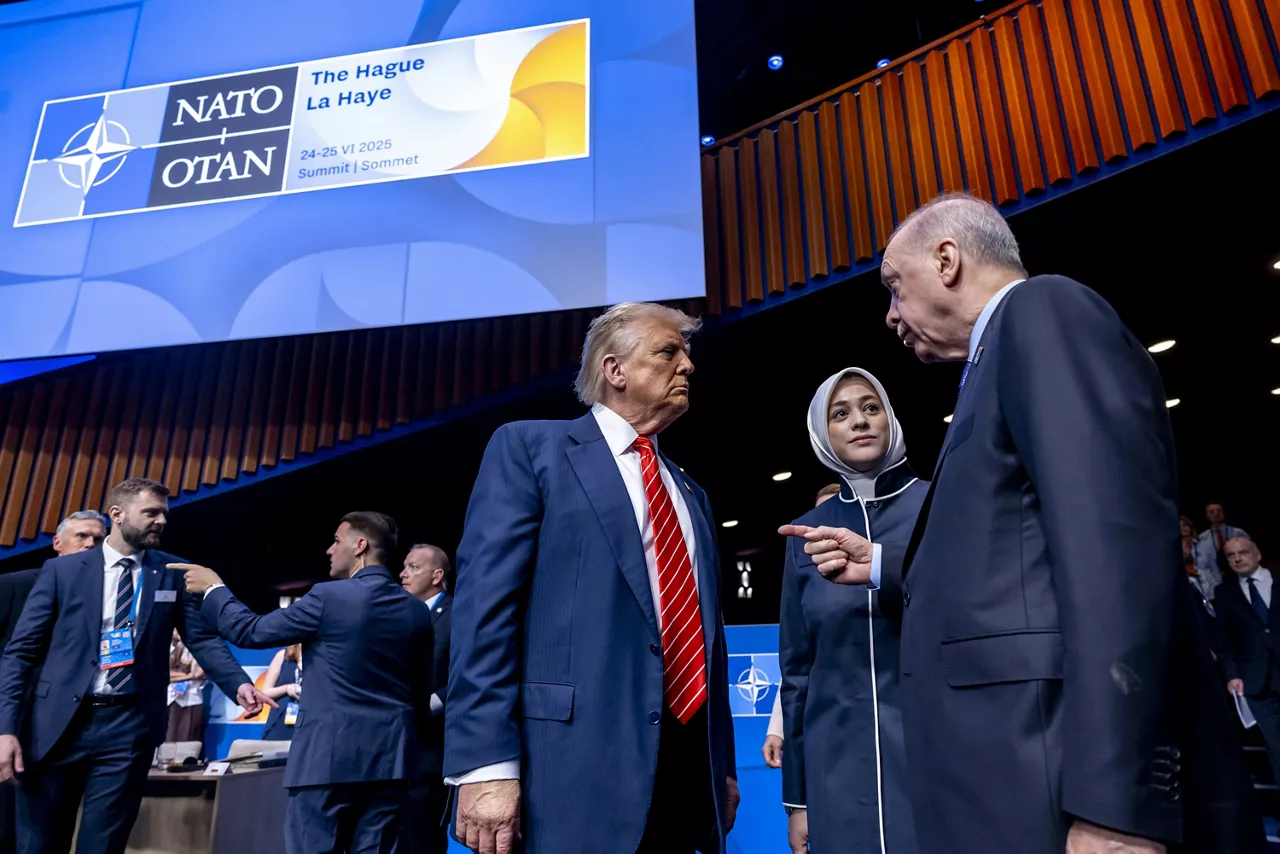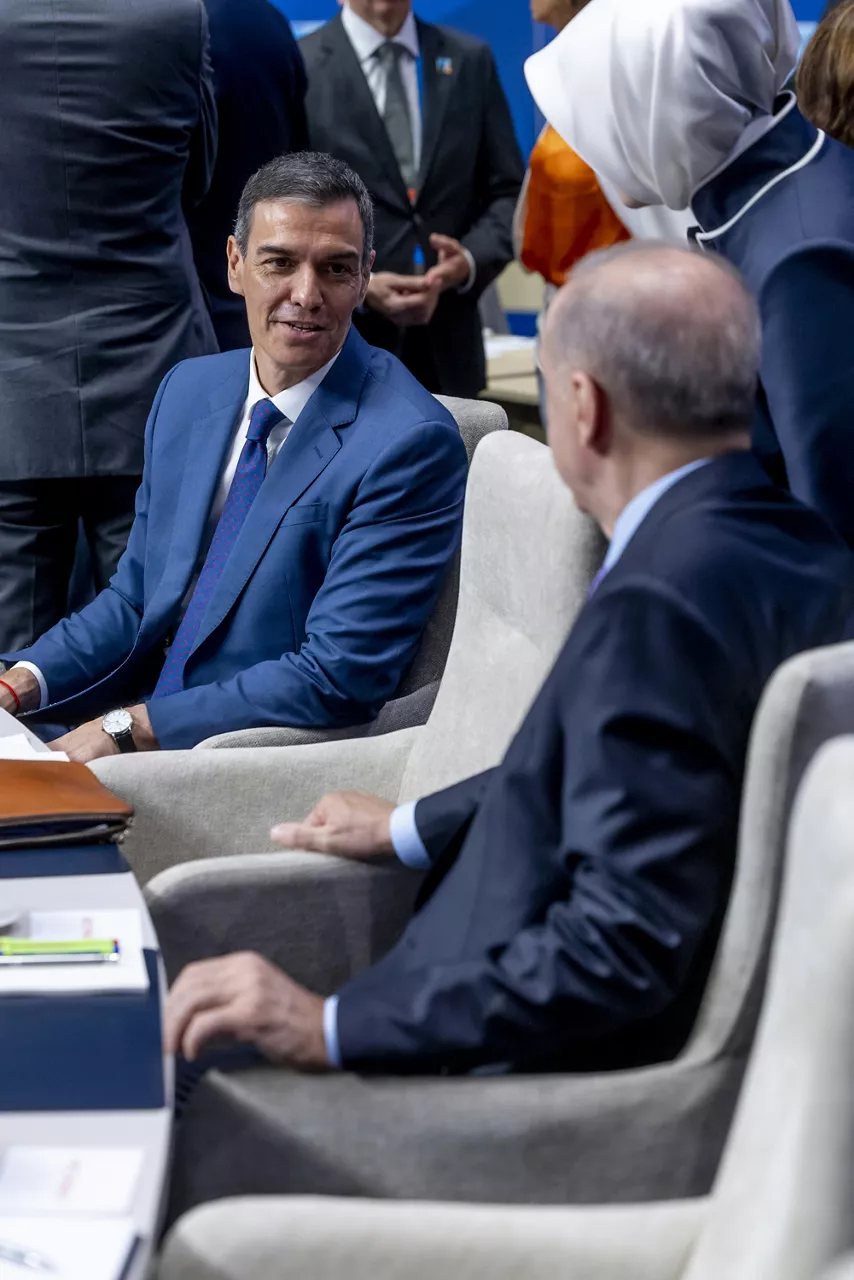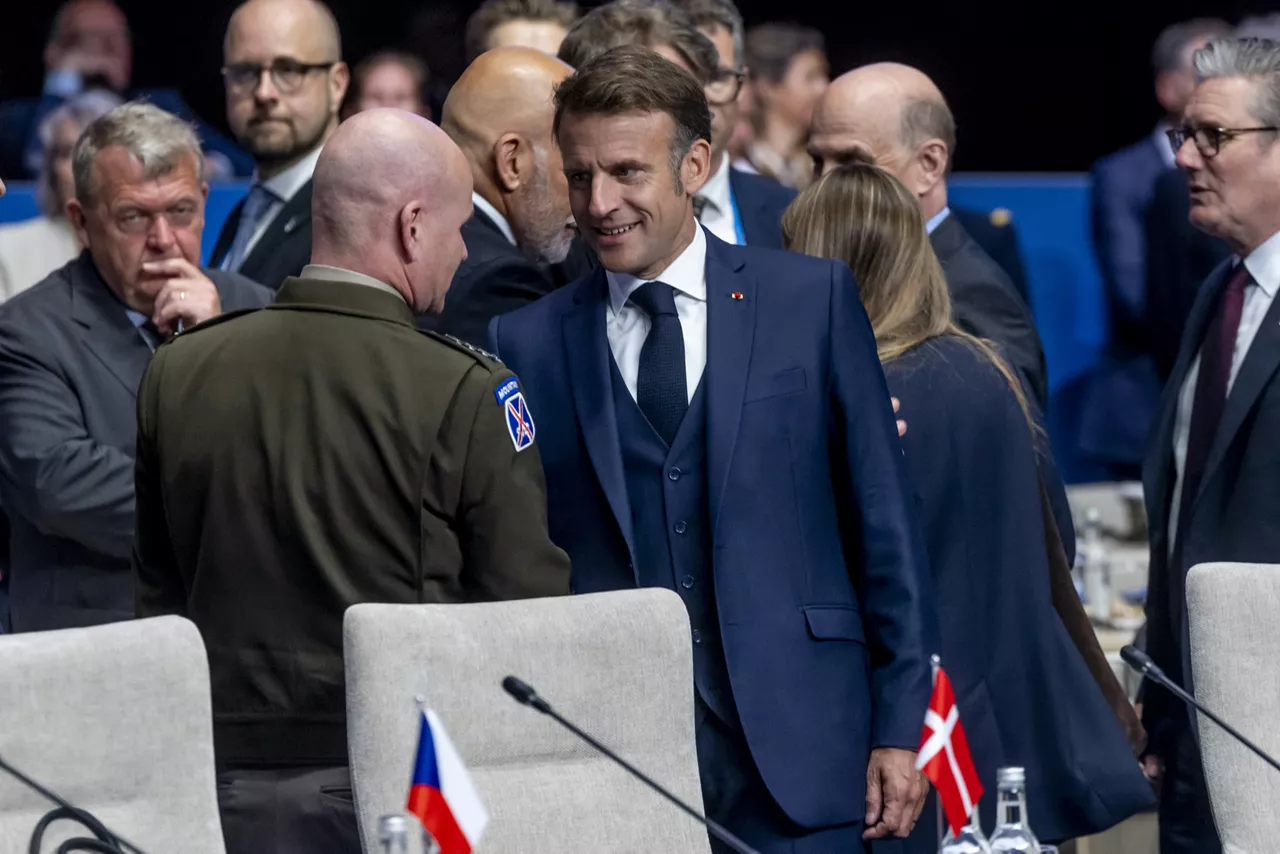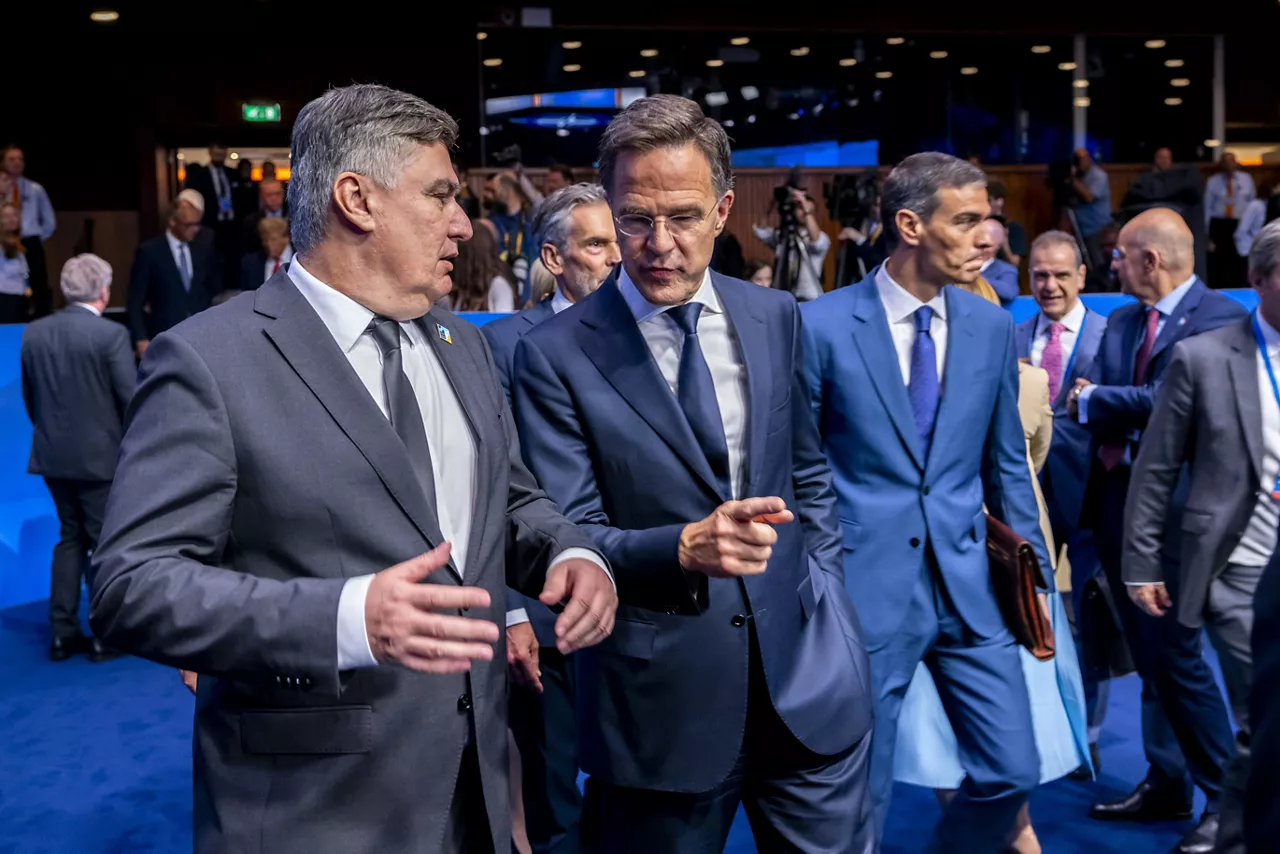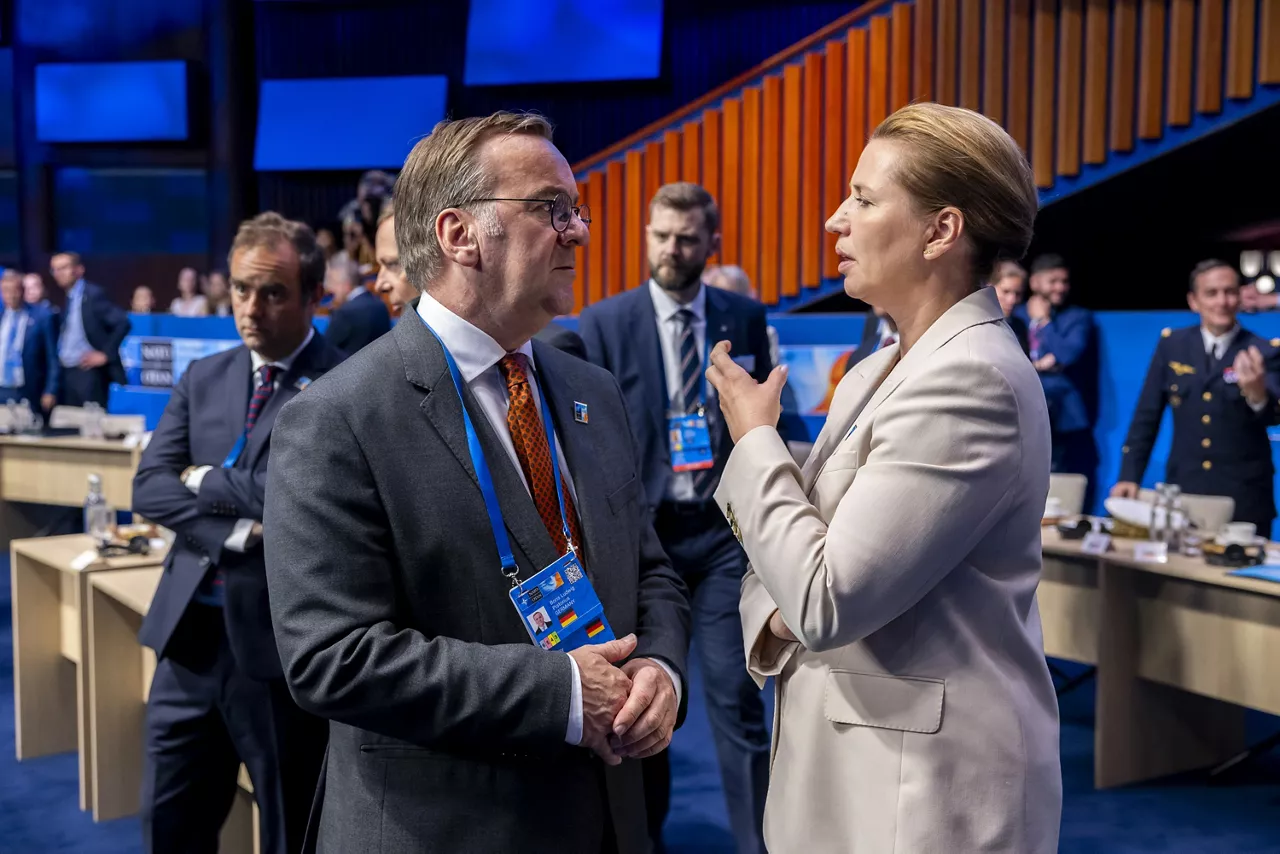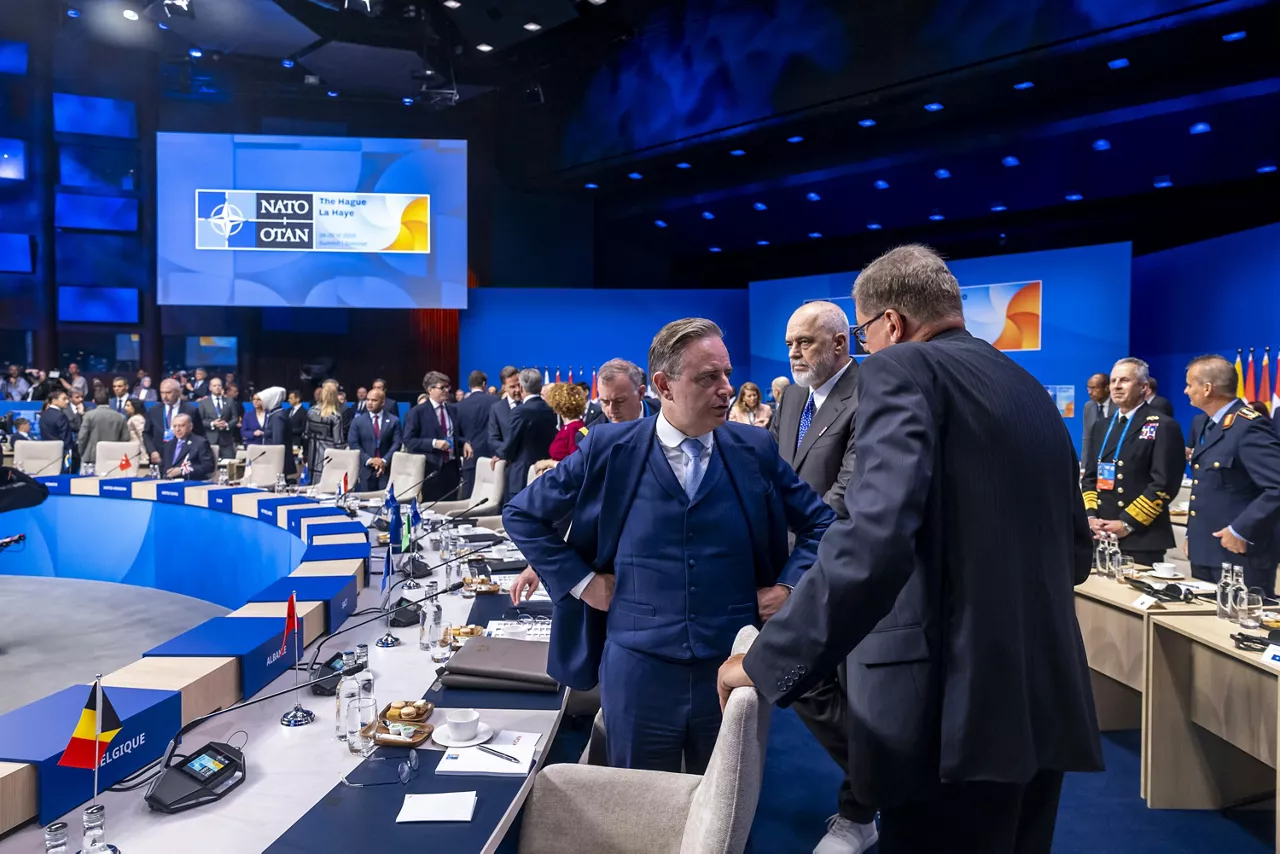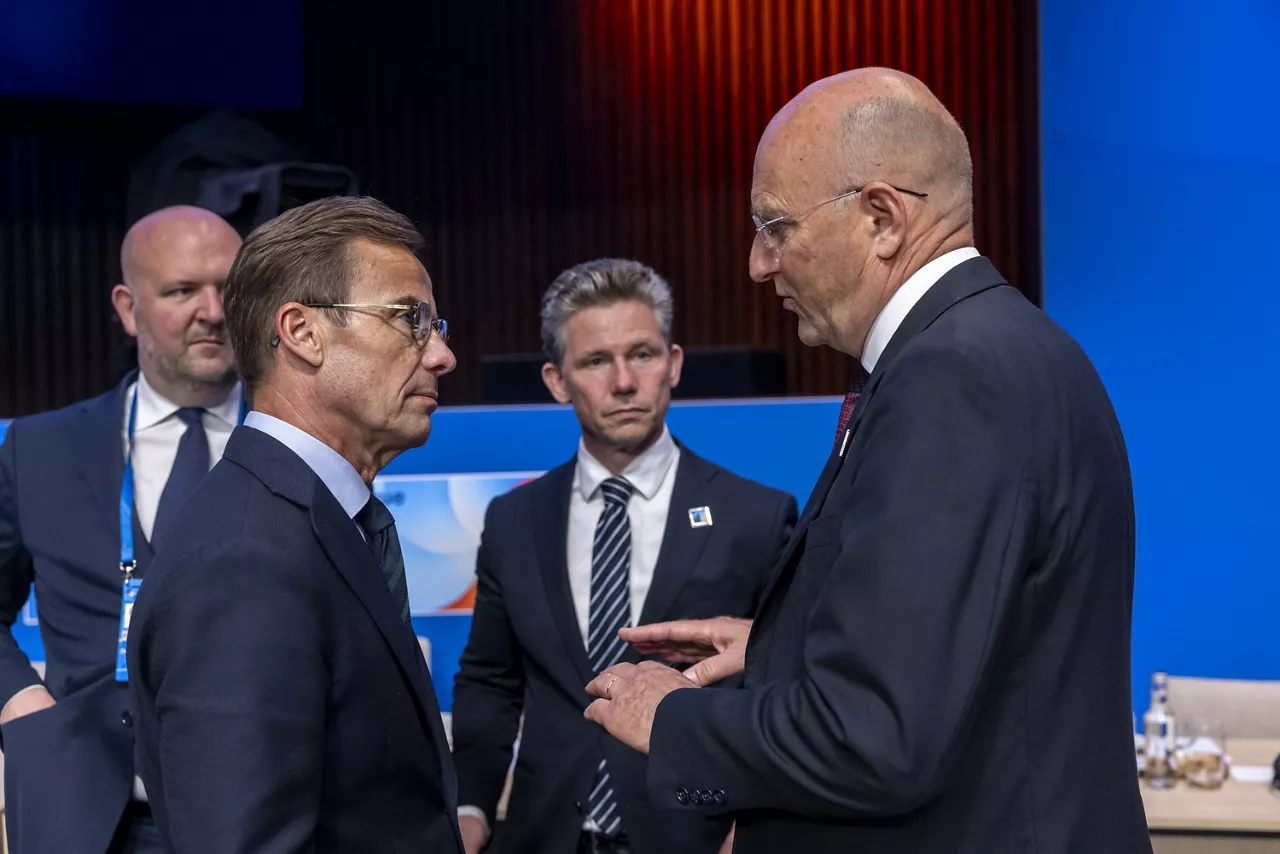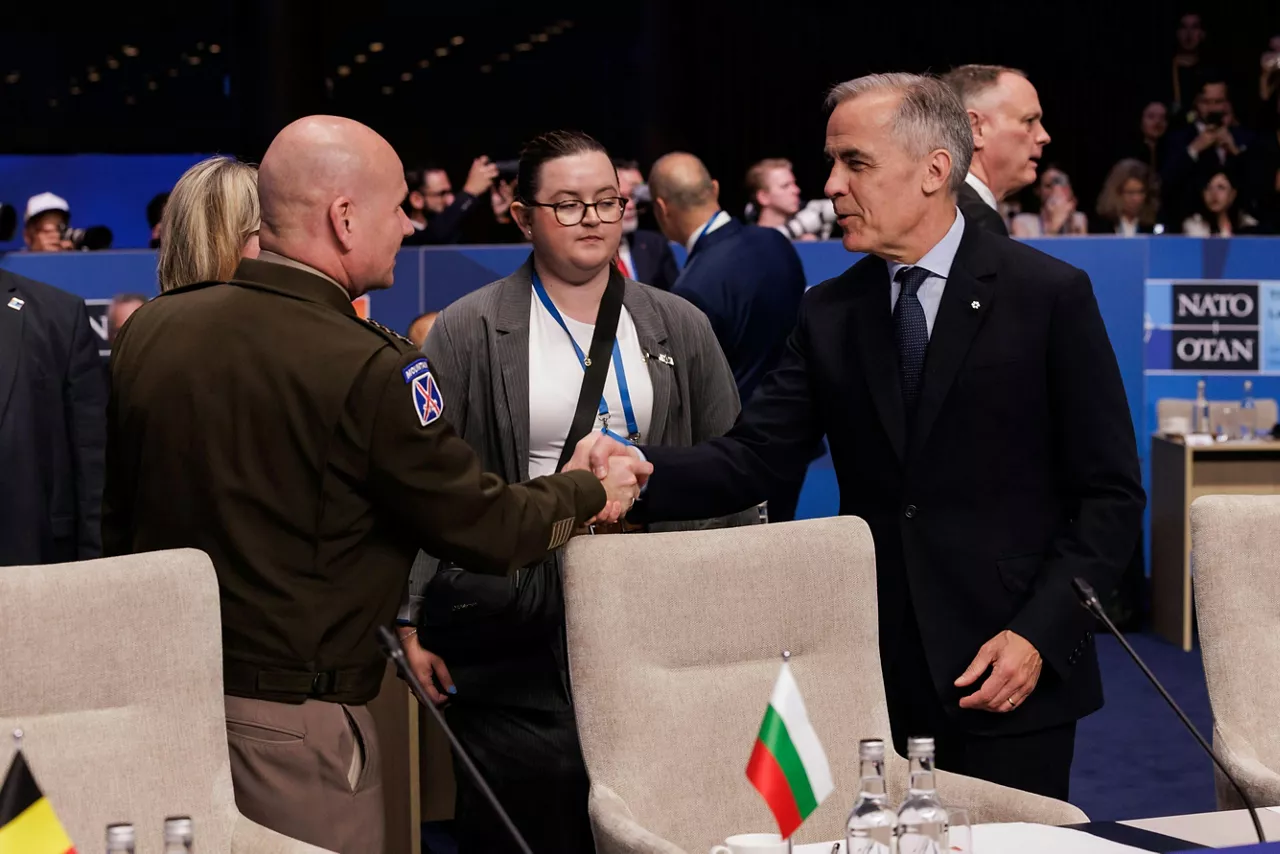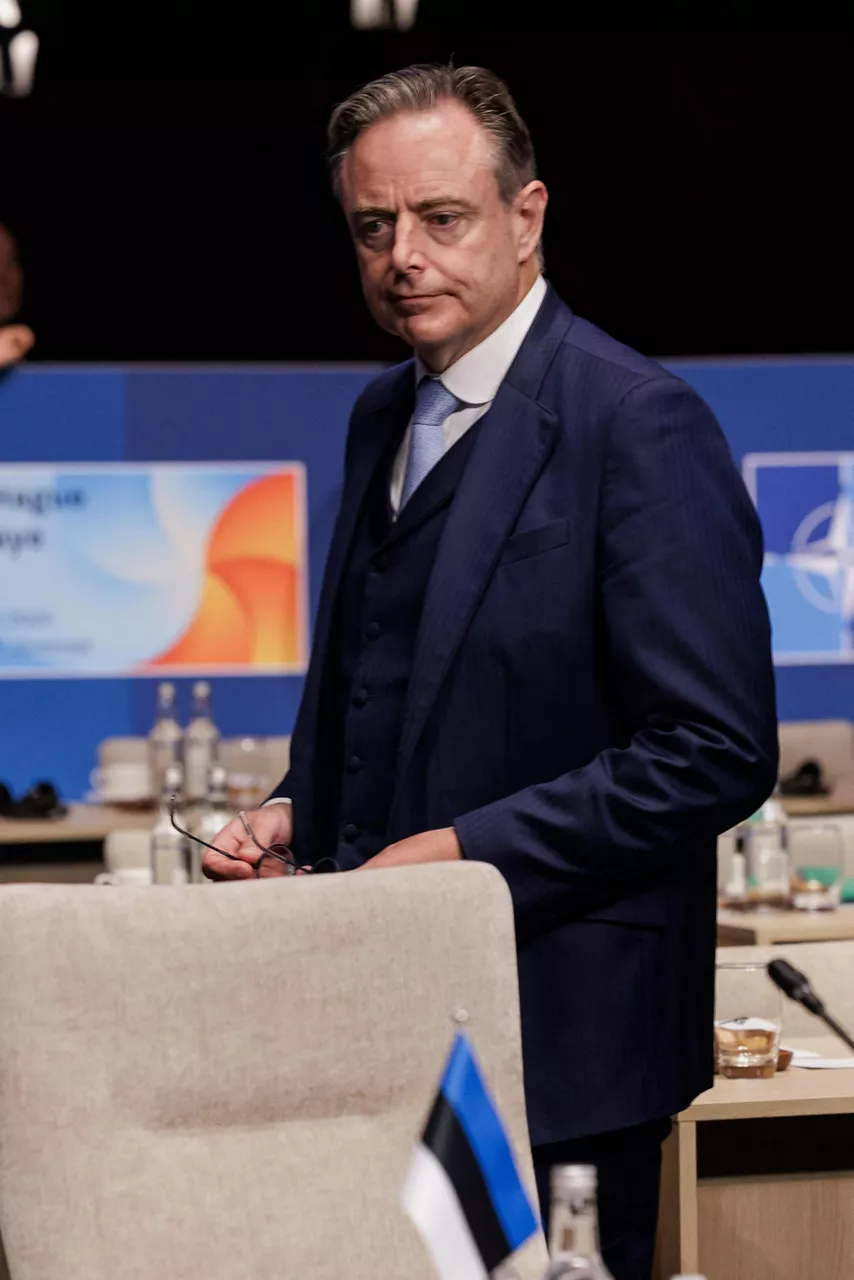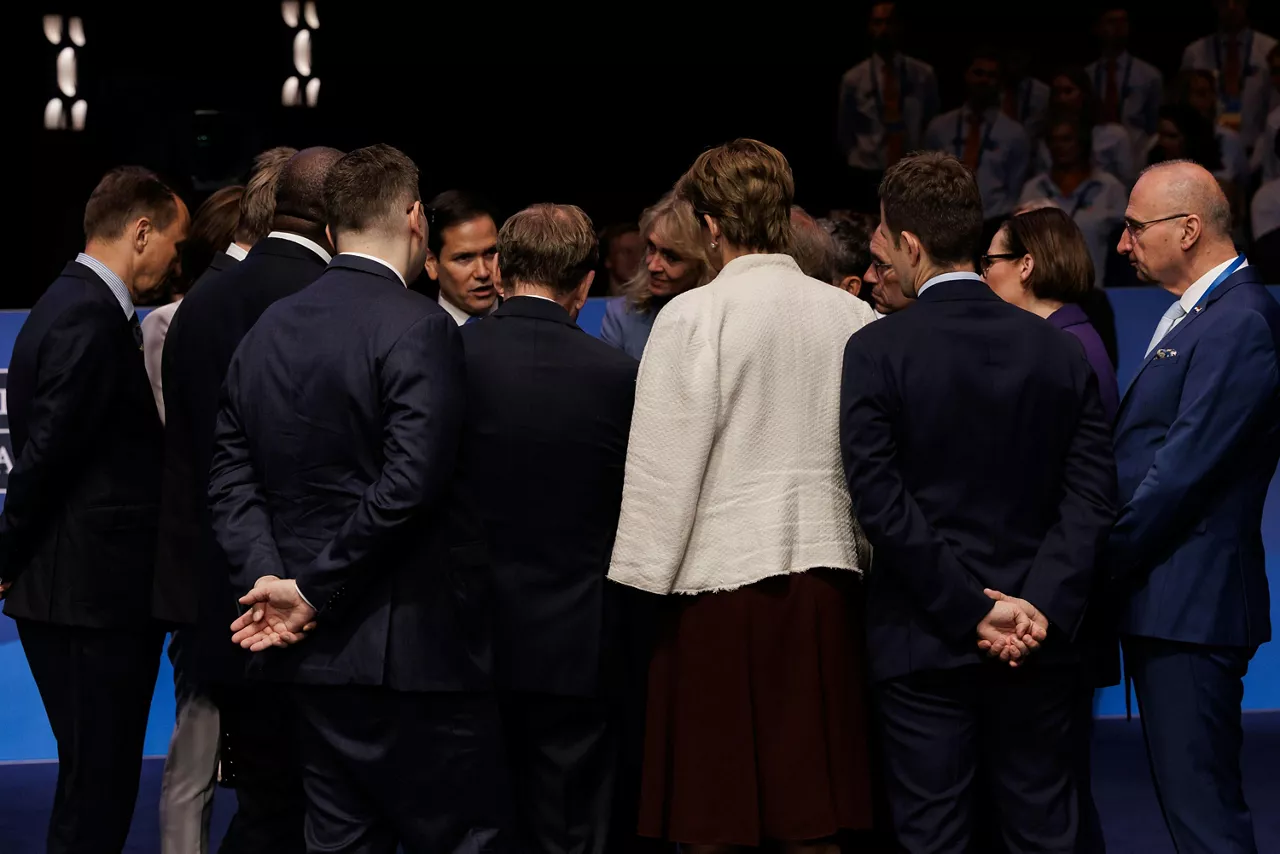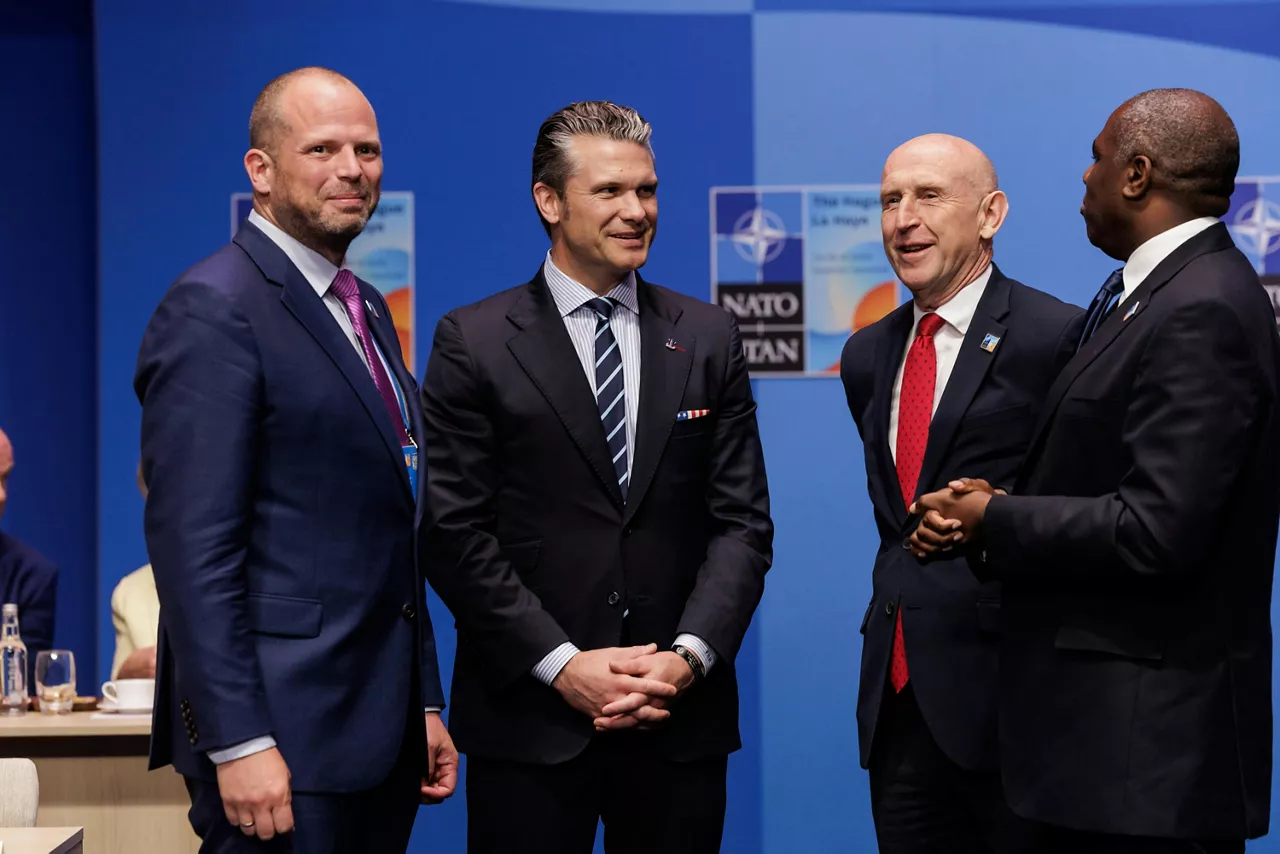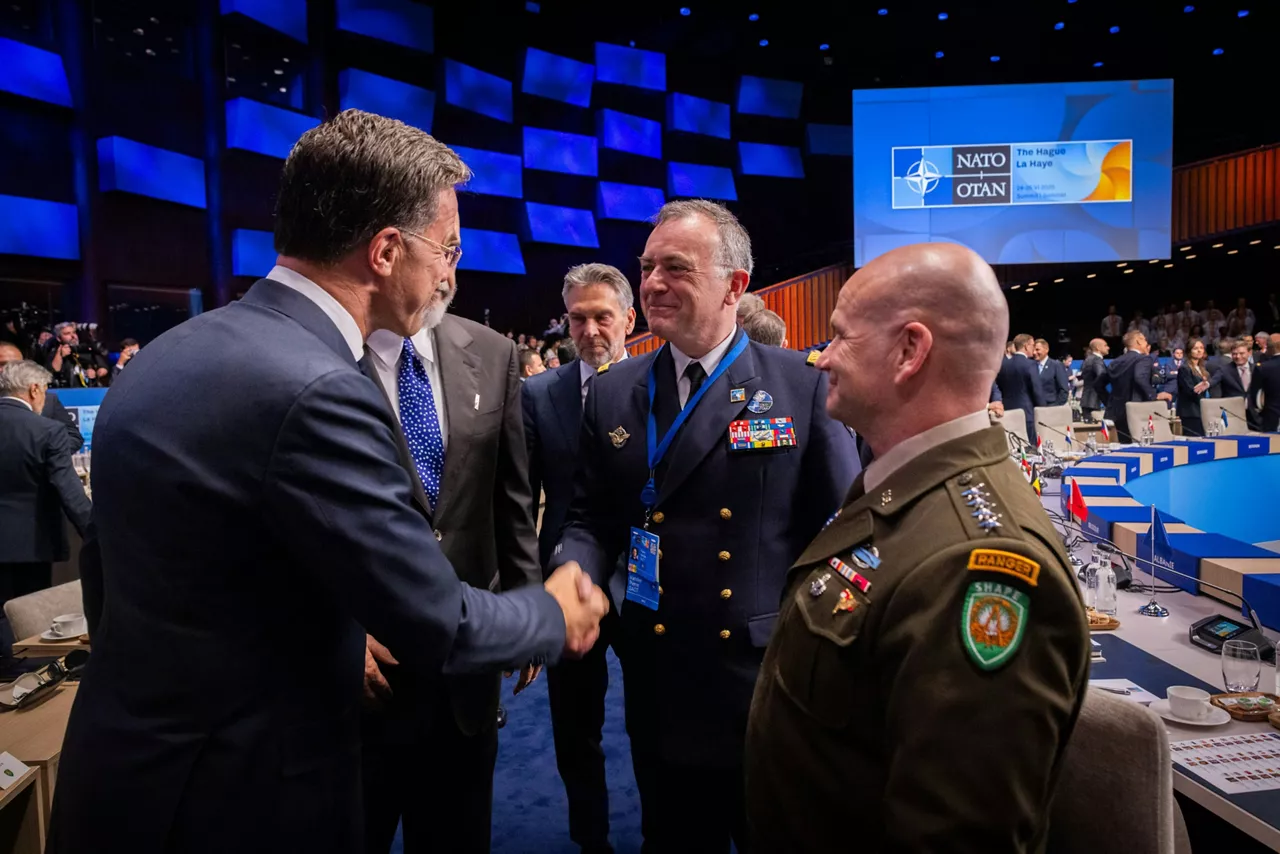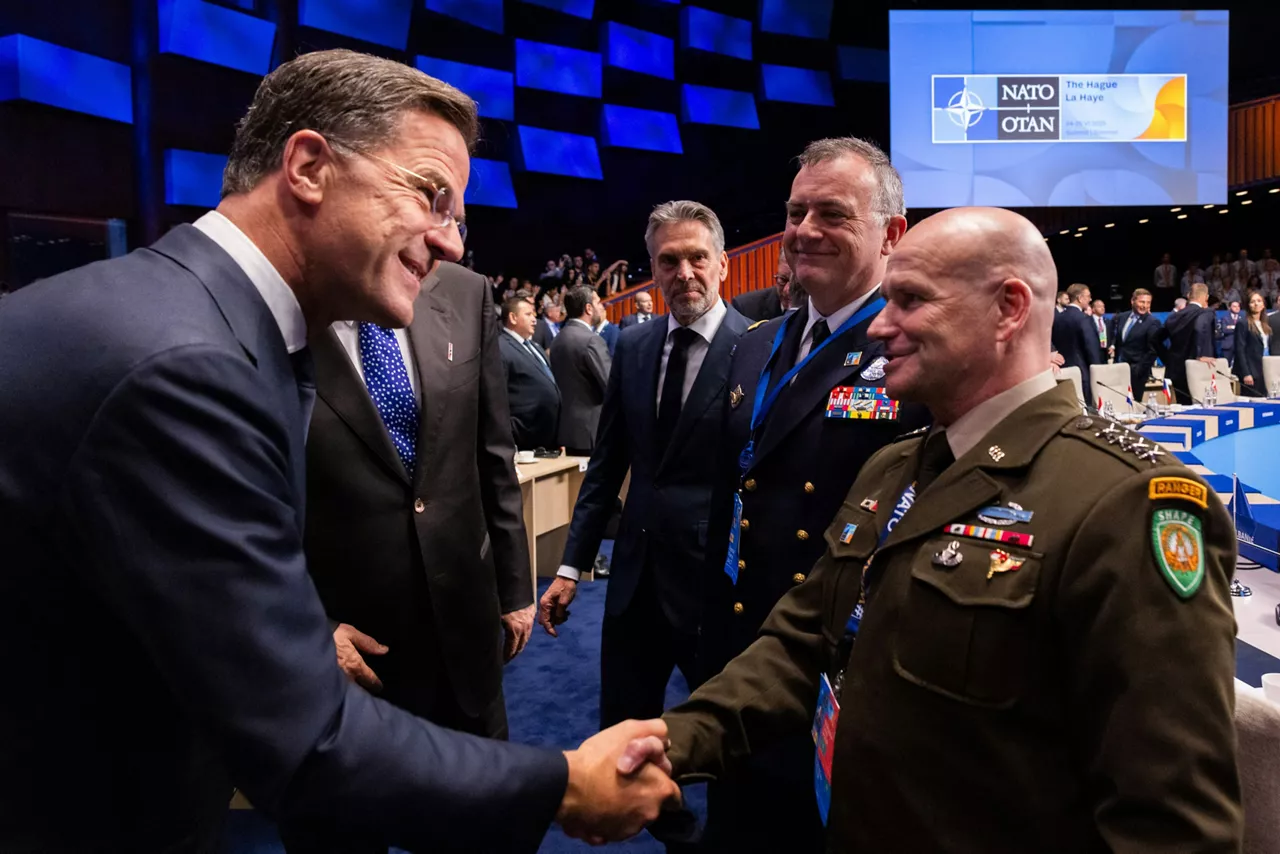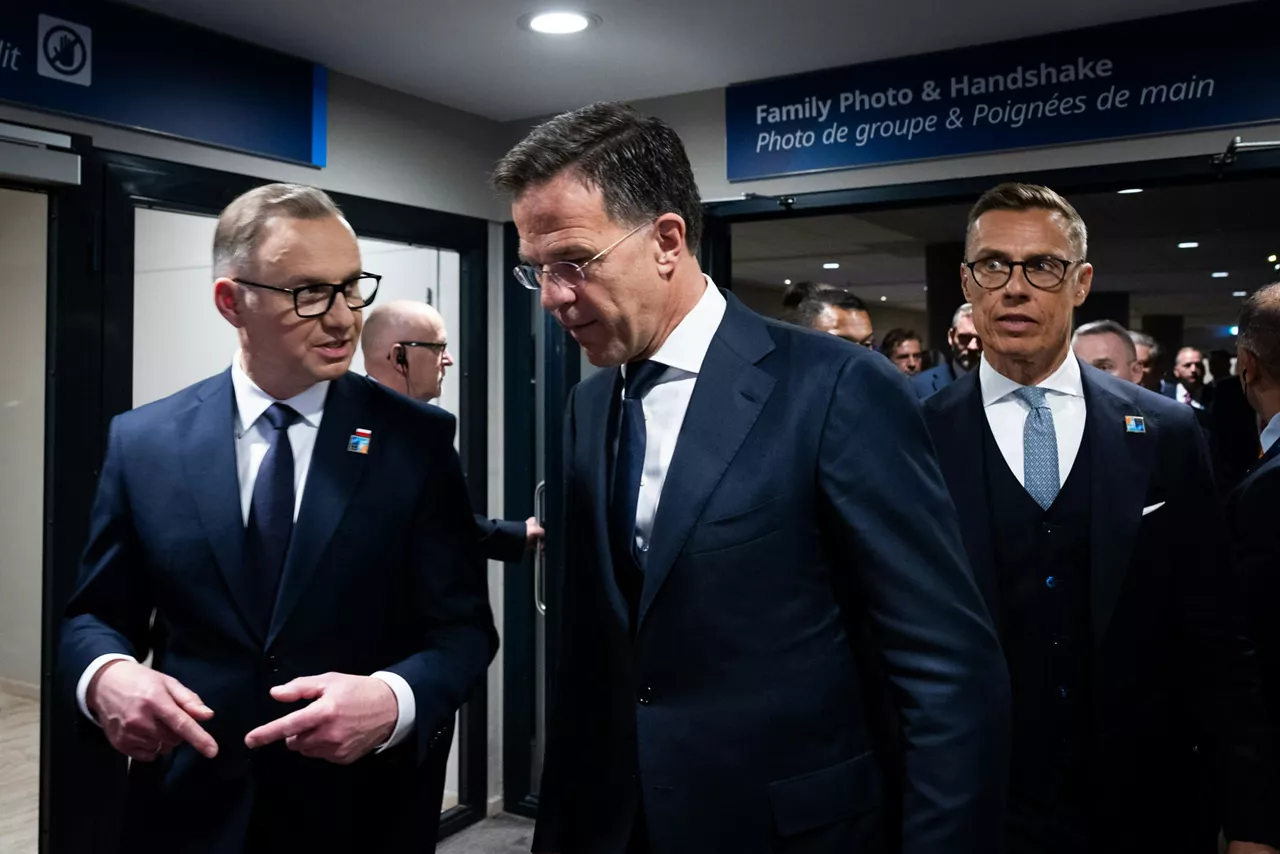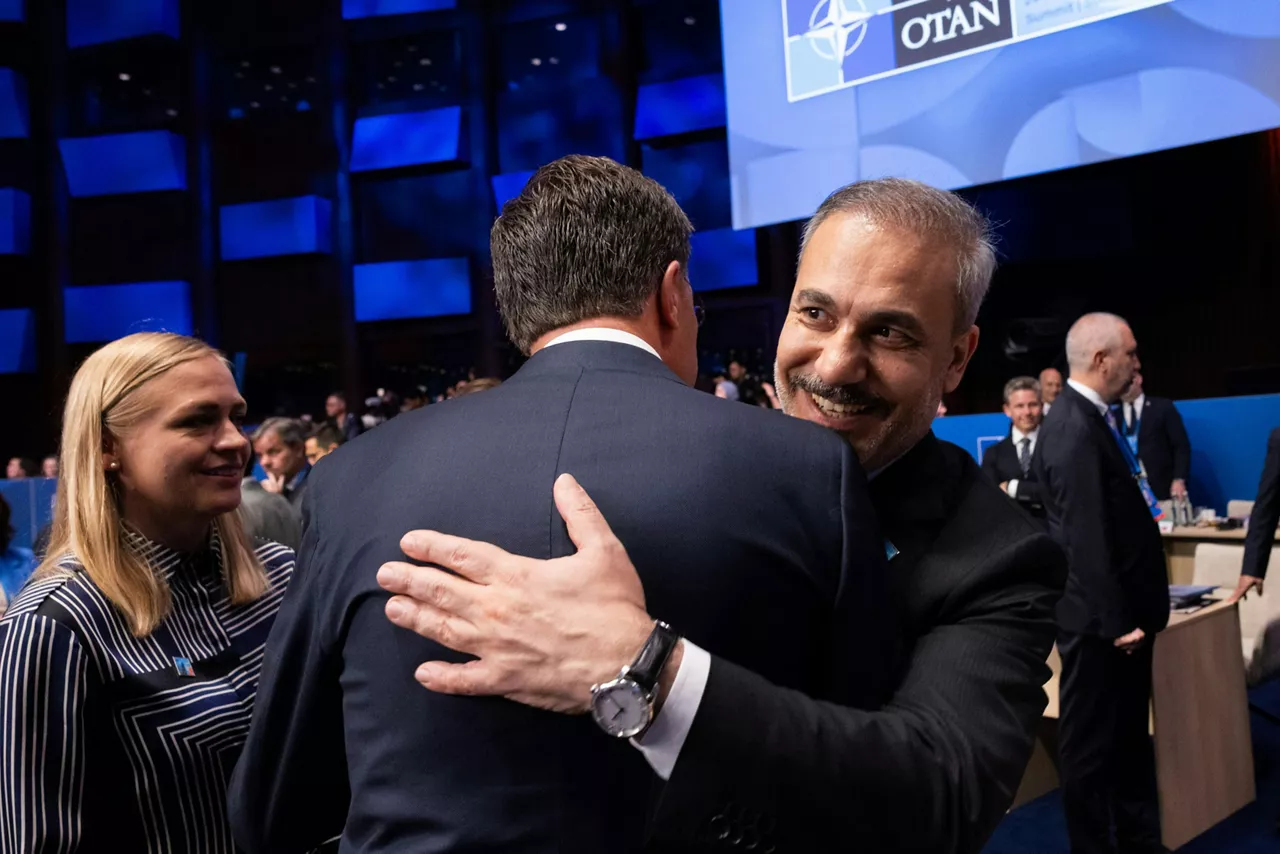Download NATO’s broadcast-quality video content free of charge

Log in
NATO MULTIMEDIA ACCOUNT
Access NATO’s broadcast-quality video content free of charge

Check your inbox and enter verification code
You have successfully created your account
From now on you can download videos from our website
Subscribe to our newsletter
If you would also like to subscribe to the newsletter and receive our latest updates, click on the button below.
Enter the email address you registered with and we will send you a code to reset your password.
Didn't receive a code? Send new Code
The password must be at least 12 characters long, no spaces, include upper/lowercase letters, numbers and symbols.
Your password has been updated
Click the button to return to the page you were on and log in with your new password.
(As delivered)
Yes good afternoon. And we have just concluded the formal part of the NATO Summit in The Hague. Of course, there will be many other meetings later today and this afternoon.
Together, Allies have laid the foundations for a stronger, fairer and more lethal NATO.
NATO leaders agreed on the The Hague Defence Investment Plan. And this will fuel a quantum leap in our collective defence.
They agreed to boost our defence industries – which will not only increase our security but will also create jobs. And we have reaffirmed our unwavering support for Ukraine. All of this is crucial.
It means that no matter the challenges we face – whether from Russia or terrorism, cyberattacks, sabotage or strategic competition – this Alliance is and will remain ready, willing and able to defend every inch of Allied territory. And ensure that our one billion people can continue to live in freedom and security.
These decisions will have a profound impact on our ability to do what NATO was founded to do – deter and defend. And the key decision in that regard is to adopt the The Hague Defence Investment Plan.
With this plan, Allies have agreed to invest 5% of GDP in defence. This is a significant commitment in response to significant threats to our security.
It includes at least 3.5% of GDP invested in core defence requirements – a benchmark that until today was set at 2%. A target that I am pleased to say all Allies will now meet this year or have already met.
The 3.5% is to fund our militaries and the equipment they need – from our air defences to ammunition, drones, tanks, troops, and more.
In addition to the 3.5% for core defence, the plan includes 1.5% of GDP that will go towards investments that support our defence and security. All to ensure we can effectively deter aggression and defend ourselves, and each other, should anyone make the mistake of attacking.
Allies recognise the severity of the threats we face. And in response they have come together to agree an ambitious but essential new defence spending commitment.
Our decisions today show, from the Mediterranean to the Arctic, from the west coast of North America to our Eastern flank – all Allies are united in understanding that we need to step up to stay safe – and they are acting on it.
President Trump has been clear, America is committed to NATO. He affirmed that again today in no uncertain terms.
At the same time, he made clear that America expects European Allies and Canada to contribute more. And that is exactly what we see them doing.
European Allies and Canada will do more of the heavy lifting, equalising their spending, and taking greater responsibility for our shared security.
Of course, work does not stop here. This is day one.
We now shift from agreeing on what we need – to rolling up our sleeves and making this new plan our reality. And part of this requires that we rapidly expand our defence industrial capacity on both sides of the Atlantic.
We need quality and quantity. We need to innovate and we need to act fast. So we will continue our work to bring down barriers. We will leverage our partnerships with the European Union, with Ukraine, and in the Indo-Pacific to foster defence industrial cooperation. And there are major economic benefits with the potential for literally millions of extra jobs across the Alliance.
The decisions made today will make NATO much stronger.
They will also make NATO a fairer Alliance with Europe and Canada stepping up and carrying their fair share of the responsibility for our shared security.
The resolve of Allies is clear. We are in this together. Committed to Article 5. And we are determined to stand firm. No one should doubt our capacity or determination should our security be challenged. This is the stronger, fairer and more lethal Alliance that NATO leaders have begun to build.
Of course, this is also an Alliance that stands firmly by our neighbour and partner, Ukraine.
My dear friend, Volodymyr Zelensky, is here in The Hague with us at the NATO Summit, along with his team. Our resounding message to him and the Ukrainian people is that Ukraine has our continued support, including with over 35 billion euro pledged so far this year, with more to follow.
All of this, our aim is to keep Ukraine in the fight today, so that it can enjoy a lasting peace in the future. We stand by Ukraine in its pursuit of peace and will continue to support Ukraine on its irreversible path to NATO membership.
It has been a momentous meeting today. Leaders have agreed on a trajectory that will ensure we are able to safeguard our freedom and security well into the future.
And with that, I am happy to take your questions.
Allison Hart, Acting NATO Spokesperson
All right, I will call on people and please, if you could state the outlet you're from. If I don't know that already. We'll start with Sky News, right here in the front and the centre. We need a mic here. Thank you.
Deborah Haynes, Sky News
Thank you. Deborah Haynes from Sky News. Hello. The language that you have used when talking to Donald Trump has been notable because of its flattery. Today you called him daddy, and you sent a text message to him that was gushing with praise. Is this the way that you feel that you have to act when doing business with the US president, through flattery and praise? Isn't it a bit demeaning, and doesn't it make you look weak?
NATO Secretary General Mark Rutte
No, I don't think so. I think it's a bit of a question of taste. But I think he's a good friend, and when he is doing stuff which is, forcing us to, for example, when it comes to making more investments, I mean, would you ever think that this would be the result of this summit if he would not have been re-elected president?
Do you really think that the seven or eight countries who said yes, somewhere in the 2030s we might meet the 2%? We've now all decided the last four or five months to get to 2%. So doesn't he deserves some praise? And when it comes to Iran, the fact that he took this decisive action, very targeted, to make sure that Iran would not be able to get his hands on a nuclear capability, I think he deserves all the praise.
Allison Hart, Acting NATO Spokesperson
All right, next question, let's come to the front here. I think it's BBC, yes. Wait for the mic please.
Jamaluddin Mousavi, BBC Persian
Jamaluddin Mousavi from BBC Persian TV. You said that attack against Iran was legal, and in accordance with the international law. But today, Kaja Kallas said she is not sure that it was legal and in accordance with international law. Is there any kind of disagreement between you in NATO?
NATO Secretary General Mark Rutte
No, there's not, but it will be many views, always about international law. I think what US did last weekend is justified. This is preventing Iran and this is a request NATO has had for a long time. Position NATO has taken for a long time, that Iran should not get its hands on a nuclear deterrent.
So I think it was totally justified what the US did. And I think it's also important that the American President is very much now working to get the cease fire, not only today and yesterday, but to have that ongoing over the coming weeks.
Allison Hart, Acting NATO Spokesperson
All right. I see FT, in the halfway back.
Henry Foy, Financial Times
Secretary General, Henry Foy, Financial Times, thank you for the floor. Donald Trump has said the US won't agree with the 5%, that's for all of us to do, but not him. Is that fair in an alliance that's built on sharing and unity? And secondly, what will you do if he comes back next year and asks for more than five? Thank you.
NATO Secretary General Mark Rutte
Well, when it comes to the 5%, there are the two elements. One is the 3.5% core defence spending, the US is more or less there. And when it comes to the 1.5% defence related spending, we can safely assume that US is doing that. When you look at their enormous capacity when it comes to cyber fighting, cyber-crime, hybrid threats, when it comes to their infrastructure investments, when it comes to developing the defence industrial base. So, I think we can safely assume that the US is more or less at 5% already.
Allison Hart, Acting NATO Spokesperson
All right, next, I think we'll go over to the left side again about halfway back. Washington Post.
Ellen Francis, Washington Post
Thank you. Secretary General. Ellen Francis, Washington Post. NATO Allies will have to go to great pains to convince people that this money should be spent, because of a Russian threat. But some of the comments at this summit suggest that it's all about pleasing President Trump. I think Secretary Rubio called it the Trump Summit. Do you agree that it's the Trump Summit, and how much of this pledge is about keeping the US president happy? Thank you.
NATO Secretary General Mark Rutte
Well, there are two issues to this, and to the 5%. One is that there is this consistent ask from the US. This started already with Eisenhower in the 1950s, for the Europeans and the Canadians to equalize with what the US is spending. And now finally, we are going to do that.
But obviously the 3.5 core spending, and the total 5% is deeply rooted in the outcome of a process in NATO, the NATO defence planning process, which has led to agreeing, by the defence ministers two weeks ago, on our targets. So what each country needs to do, when the call would come, if the call would come, we need you to help, because there's an Article Five situation.
And we have calculated that to basically reach those targets, we need to spend 3.5% on core defence, and, of course, the 1.5 on defence and security related spending. So, there is this US request, please equalise, because it's not fair that we shoulder much more than the others are doing, and that we are carrying more weight than the others are doing. And then there is the issue of that it is really necessary because of the long-term threat by the Russians, to the whole of the Euro Atlantic area, and also the other upcoming adversaries, and of course, the situation with China, where we see this impressive military build-up. So, it is both true. The US has consistently had this request now for 60, 70 years. And finally, we will do it. And I think that's important. It makes the whole of the Alliance more stable and fairer, and it is the need, because of Russia and others.
Allison Hart, Acting NATO Spokesperson
All right, the woman in the third row, over on the left side.
Nataliia Rop, NV (New Voice)
Nataliia [inaudible], New Voice of Ukraine. Secretary General, you have stated that this year, Canadians and Europeans have pledged 35 billion, into military support to Ukraine, and this is not even the half of the year.
In your opinion, what should be expenditure for Ukraine at the end of the year? And what amount of military aid to Ukraine could help Ukraine to win the war, not just survive?
NATO Secretary General Mark Rutte
Well on the first question, it's difficult for me to exactly predict, but you can safely assume, that the trajectory in the first almost six months now, is really north of the trajectory last year. That also, by the end of the year, it will end up north of the over 50 billion, which was pledged in 2024. So I'm positive about that, optimistic, but I'm not going to make a concrete prediction.
But let's, I mean, we can safely assume that the end result will be positive. And of course, what we are doing here, we have to make sure that Ukraine can stay in the fight, that Ukraine has what it needs to be as strong as possible.
But obviously we are all, also working on getting a peace deal done, or a long-term cease fire done. And then we have to make sure that Ukraine has what it needs, to prevent Vladimir Vladimirovich Putin from ever, ever trying this again in the future. And the first layer of that, making sure that Ukraine can defend itself post a peace deal, slash a long-term cease fire, obviously, is also the support we are now providing to keep them in the fight, which has to do, of course, with training. It has to do with delivering military equipment, so the command in Wiesbaden, but also the various streams of money going into Ukraine, developing Ukrainian defence industrial base, which still has about a 35 billion spare capacity.
So, this all together will help Ukraine to be as strong as possible now, but also to deter the Russians post a peace deal/cease fire.
Allison Hart, Acting NATO Spokesperson
All right, let's come to the centre section now. I see CNN in the fourth row.
Kaitlan Collins, CNN
Thank you so much. I want to follow up on what you just said about the strikes in Iran. But first, can I ask you on Article Five? Do you believe that Article Five is subject to interpretation?
NATO Secretary General Mark Rutte
You know, Article Five is absolutely clear. And at the same time, we have always said we will never go into details when exactly Article Five will be triggered. And why not? Because we don't want to make our adversaries any wiser.
Kaitlan Collins, CNN
Follow up on Iran, sir, you just praised the US strikes in Iran, saying that you do believe it will help prevent Iran from getting a nuclear weapon. There have been questions about where that highly enriched uranium is, and if Iran moved it, before the United States struck on Saturday night. Do you have concerns about that, and whether or not it poses a threat to NATO?
NATO Secretary General Mark Rutte
Look what happened last weekend. American B-2s. Nobody in the world is able to do this. Only in United States. You are 25% of the world economy. You are by far the biggest military power in the world. Only United States is capable to do this. So, B-2s, their fantastic pilots in those fighter jets, the bombs which were used to get deep into these nuclear facilities in Iran. Nobody has that type of stuff.
And history made you the leader. History made you the ones who have to take action when it is necessary. And I think what President Trump did here, is take a very targeted, surgical, operation to take out as much as possible Iran's capability to get to a nuclear weapon. And I commend him for that.
And obviously it's now up to, all the studies being done and all the details looked into what exactly has been the effect of this. But I'm personally very optimistic that this has dealt a massive blow to Iran.
Allison Hart, Acting NATO Spokesperson
All right, we have a very full room and limited time. Next question to the front row. There's a mic coming.
Eelco Bosch van Rosenthal, Nieuwsuur
Hello, Eelco Bosch van Rosenthal, Nieuwsuur, Dutch TV. You're dealing with a very unpredictable President, or friend, who has been all over the map on Article Five in the past. In his first term, he threatened to pull out of NATO, which he doesn't seem to do anymore. But how do you know? How are you certain that the Trump you're dealing with right now is the same version of Trump that you'll be dealing with for the rest of his term?
NATO Secretary General Mark Rutte
I've now known for almost 10 years. He's a good friend. I trust him. He was totally right, that Europe and Canada were not basically providing to NATO what we should provide. And that the US was spending so much more on defence than the Europeans and the Canadians. Now we are correcting that. We are equalising.
I think he is a man of strength, but also a man of peace. You've seen that basically now with Iran, the man of strength being able to command his B-2 bombers to go into Iran to take out a nuclear capability. But also the man of peace, who is then immediately following up with making sure that Israel and Iran will commit to a ceasefire. And I think this is exactly what you want the American President to do, provide that type of leadership. And so I find him very predictable.
Allison Hart, Acting NATO Spokesperson
Next question all the way in the back, DPA.
Ansgar Haase, DPA
Ansgar, German Press Agency, DPA. Secretary General, I would like to come back to Article Five. Did President Trump promise in the meeting that he would stand by the Allies until the end of his term? And if so, did he promise it without any conditions?
NATO Secretary General Mark Rutte
Can I ask you, and not you, you're a journalist, so you're totally of course free to ask all those questions, but through you to some politicians in Europe and Canada to stop worrying. United States is totally committed to NATO. United States is totally committed to Article Five. How many times do we want them to say this? And as I said before, we have now had half a year when we constantly asked the US, ‘Are you with us? With NATO, with Article Five?’ So let's look for another country in NATO, one of the other 31, Iceland, the Netherlands, France or Canada, for the next half year, to answer that question.
Allison Hart, Acting NATO Spokesperson
All right, limited time. Lots and lots of questions. The woman in the green jacket here in the third row.
Cathy Newman, Channel 4 News
Cathy Newman, Channel 4 News, hello. You described in the communiqué Russia as a long-term threat. Isn't Putin an immediate threat? Did you water that language down to get agreement?
NATO Secretary General Mark Rutte
No. Of course. If you're a long-term threat, you're also a short-term threat. So he is a threat now, and he is as a threat in long term.
Allison Hart, Acting NATO Spokesperson
All right. Same row, the woman in the white shirt with the glasses.
Iida Hallikainen, Ilta-Sanomat
Thank you, Iida Hallikainen and from Ilta-Sanomat, Finland, Mr. Secretary General, Russia has expanded its military infrastructure near Finland's eastern border. What is Russia aiming to achieve with this? And what is NATO's message on the matter? And second, if I may, is Spain now serious about the defence spending goal?
Mark Rutte, NATO Secretary General
Yes on the last question, I believe so. As you know, there is this agreement to disagree that they think they can reach its capability targets by 2.1%. NATO is saying it has to be 3.5, like for all the other Allies.
All Allies will report on how they are getting to the capability targets. So we will see. And in 2029 we will anyway, have a review of all of this.
And your first question, well, let's not be naive about Russia. Of course, they are fighting this totally unprovoked war against Ukraine. But at the same time, and this is what we have been hearing, open source, from many senior military leaders in Europe, including the Chief of Defence in Germany, they are building up their armed forces and reconstituting their armed forces at such a pace that they could be ready in three, five or seven years, to attack NATO. And that is why today was so important, and today is so transformational.
Yes, to the question before, because we have to equalise with the US and end the debate, which has now been running for 60, 70 years. But particularly also because we know that there is this Russia threat, short-term, long-term, whatever. But the Russia threat is there. And we have to make sure that we can defend ourselves, and that is why we are doing this.
Allison Hart, Acting NATO Spokesperson
Okay, we just have time for a few more questions. NHK, so fifth row here.
Sachiyo Sugita, NHK
Sachiyo, for NHK, the public TV station of Japan. Thank you. My question is about the IP4 countries, but, which were here in The Hague. But so, I know you've been mentioning that you won't lecture the whole world, but since you were able to make this historical decision today, do you think this would trigger other countries, like the IP4 countries to, like, think twice about their threats around them and their defence spendings?
NATO Secretary General Mark Rutte
Well, we have had this close cooperation. And yesterday, an excellent meeting with the Japanese foreign minister. We will have a meeting with the senior leaders from the Indo-Pacific four countries later today, and there will be another meeting, also with President Zelenskyy and European leaders.
So but with the Indo-Pacific four, we will also meet, and this is because we know that our two areas. So the Euro-Atlantic and the Indo-Pacific are getting more and more connected. Look at North Korea being so closely involved now in the war efforts, and North Korean soldiers fighting on European soil against, on the Russian side, against Ukraine, that is rather historic.
So, this cooperation is important. It's very much focused on innovation, very much focused on procurement, on defence industrial production, making joint assessments of what is happening in the Indo-Pacific, what is happening in the Euro-Atlantic, and how the two are more and more interconnected. And I must say, when I'm speaking to the to the leaders, and I was visiting Japan early April, having a long meeting with the Prime Minister, and I met him again last week in Calgary at the G7 but also the leaders of the Republic of Korea, Australia, New Zealand, they all are very much aware that, of course, part of having a deterrence is that you spend enough on it.
You see in all these countries, debates ongoing on doing more where possible, but it is not up to me to advise them. Let me concentrate on the 32, and make sure that we do what we need to do. But I think that debate is taking place also in many countries outside NATO.
Allison Hart, Acting NATO Spokesperson
Okay, I think we've just got time for a couple more questions. The centre, fifth row, gentlemen in the very centre there.
Heikki Mikael, Helsingin Sanomat
Yes, my name is, Heikki [inaudible] from the Finnish newspaper, Helsingin Sanomat. Did you exchange views on Vladimir Putin in there, Mr. Trump seems to be in rather friendly terms with him. Would be interesting to hear what did you talked about him?
NATO Secretary General Mark Rutte
I've not changed my views of Vladimir Putin. I don't trust the guy. And of course, I had a lot of dealings with him personally, when we had a terrible situation with Flight MH 17, the Malaysian airline flight MH 17, being shot out of the air by Russia in July 2014, and Putin telling me that he was not present in the Donbas, and that he had no dealings in Ukraine. And that this, that and the other. And these were all lies. We know that.
Allison Hart, Acting NATO Spokesperson
Okay, for the sake of geographical diversity, all the way in the back, Telegraph.
Pim Sedee, De Telegraaf
Pim Sedee, De Telegraaf. Mr. Rutte, I have two short questions for you right here at the back. How do you think Vladimir Putin will look at this NATO Summit in The Hague and the appointments being made between the The Hague NATO Allies? The other question, completely different one. But how do you think, how big is the role of the Dutch King Willem-Alexander, the Queen and also Amalia in organising this NATO Summit and making it into a success?
NATO Secretary General Mark Rutte
Big role. And last night was really amazing. And I mean, we are both Dutch, and we can be very fortunate to have this Royal family. Of course, they have that overview, which many politicians were there for one or two terms and can never compete with. So, we have a King here in the Netherlands who is now in that position for 12 years. And you sense that, I mean, the breadth, the bandwith from which he is speaking, including with the American President and other leaders, is really impressive.
And I've seen the same before with his mother, Queen Beatrix.
So that is one of the huge advantages of being, of having a monarchy, and I would say, well, to your and my country, let's be happy and let's be glad and grateful that his family is willing to do that. On the other question, I mean, look what Putin achieved. He wanted to divide the West, and now Finland and Sweden have joined NATO. He wanted to defy the West and now we have committed to a 5% spending target. So, he cannot be very happy, and he should not be very happy.
Allison Hart, Acting NATO Spokesperson
All the way in the front on the left.
NATO Secretary General Mark Rutte
Okay, never give the microphone away.
Dejan Sajinovic, Nezavisne Novine
I will stand up so that you can see me. Dejan Sajinovic, Nezavisne newspaper from Bosnia Herzegovina. Thank you very much for this opportunity. So, for the Western Balkans, for the first time, long time, it hasn't been mentioned in the communique. What does it mean for our region? You yourself are several times talking about the importance of the region for the Alliance. What can you tell us, why it's not mentioned?
NATO Secretary General Mark Rutte
Yeah. But again, this is not your traditional communique, which you would see in the UN or in NATO in the past, where you would have 60 pages, 90 paragraphs, basically talking about the world from the birth of Jesus up to today and everything in between. I mean, that's dumb. We try to focus. So we are still very much concerned. KFOR is there in Kosovo. EUFOR is there in Bosnia and Herzegovina. I was visiting the region. Had extensive talks with leadership in Bosnia, in Kosovo. I had a dinner in Brussels with the President of Serbia. So, we are very much involved with NATO. The EU, of course, is very much involved. We closely coordinate with Kaja Kallas and Ursula von der Leyen on the European side.
But what we really want to do here is not to recall all the language, like the irreversible path of Ukraine into NATO. It's still there, nothing changed. But really to focus on three core issues in five paragraphs, and one of the paragraphs is about the next meeting. So basically, four paragraphs, and that is about, as you know, production, spending, and Ukraine.
Allison Hart, Acting NATO Spokesperson
Okay, final question to the young reporters in the front.
NATO Secretary General Mark Rutte
Yes.
Allison Hart, Acting NATO Spokesperson
We'll get a mic too, just a moment.
Dutch youth correspondents
Thank you very much for this opportunity, Secretary General, we are the youth correspondents.
NATO Secretary General Mark Rutte
Absolutely, and you are here now for two days, and you've been marvellous.
Dutch youth correspondents
Thank you. There's a lot happening in this world, and many children worry about it. Do you think we children can also fight for peace, or should we trust that you could bring peace to the world? Thank you.
NATO Secretary General Mark Rutte
I cannot personally bring peace to the world, but what we can do collectively is to make sure that we are so well prepared, we are so strong, that nobody will ever attack us. So, the best way to preserve your future and that our children can live in a democratic, free, open society, where you can be who you want to be, think what you want, a free press, what you basically have in the West.
And let's be honest, it's fantastic. Is to make sure that we spend enough on our defence, particularly if we know that we have some adversaries who are really trying to get at us. So that's the best way to preserve your future, and that's what we try to do today to make that commitment. But you standing here is really touching, and we've seen each other for two days. We know each other for longer time. I really want to thank you both, and in you, all the free press sitting in this room for your fantastic work, and see you soon in Brussels or elsewhere, bye-bye, take care. Thanks.
Allison Hart, Acting NATO Spokesperson
Thank you all very much. That's all we have time for today.

